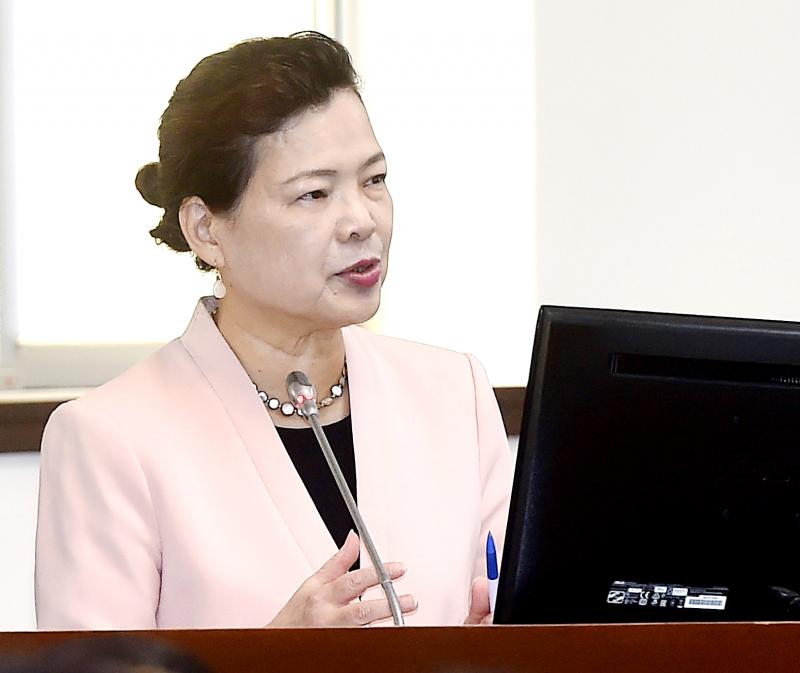The lifting of a ban on imports of pork products containing traces of ractopamine is a step in initiating talks on a potential bilateral trade agreement (BTA) with the US, Minister of Economic Affairs Wang Mei-hua (王美花) said at a meeting of the legislature’s Economics Committee in Taipei yesterday.
Answering lawmakers’ questions about the possibility of the two nations signing a BTA, Wang said that importing more US agricultural products and natural gas could expedite the process, and that it would be reasonable to expect “initial talks” in the “one to two year” time frame.
“Why has the US Trade Representative not yet initiated talks?” Chinese Nationalist Party (KMT) Legislator William Tseng (曾銘宗) asked.

Photo: Chien Jung-feng, Taipei Times
Wang said that she could not speculate, but that she believed the chances of initiating talks between the two sides within two years were “quite likely.”
President Tsai Ing-wen (蔡英文) on Aug. 28 announced that Taiwan would lift a ban on pork containing ractopamine and beef from cattle more than 30 months old, which is scheduled to take effect on Jan. 1.
While not all US farmers use ractopamine, some add it to animal feed to promote leanness.
The use of the feed additive is banned in the EU, China, Japan, South Korea and Russia among other countries and areas due to questions about its effect on human health.
Without the lifting of the ban, there would have been little hope of furthering Taiwan-US trade ties, Wang said.
“We have heard from lawmakers on both sides of the aisles that it is quite difficult to speak up on behalf of Taiwan as long as the ban is in place,” she said.
She added that members of the Comprehensive and Progressive Agreement for Trans-Pacific Partnership allow the import of pork and beef containing ractopamine.
“We can buy more corn, wheat and soybeans from the US, as well as natural gas” to help expedite trade talks, she said.

TAKING STOCK: A Taiwanese cookware firm in Vietnam urged customers to assess inventory or place orders early so shipments can reach the US while tariffs are paused Taiwanese businesses in Vietnam are exploring alternatives after the White House imposed a 46 percent import duty on Vietnamese goods, following US President Donald Trump’s announcement of “reciprocal” tariffs on the US’ trading partners. Lo Shih-liang (羅世良), chairman of Brico Industry Co (裕茂工業), a Taiwanese company that manufactures cast iron cookware and stove components in Vietnam, said that more than 40 percent of his business was tied to the US market, describing the constant US policy shifts as an emotional roller coaster. “I work during the day and stay up all night watching the news. I’ve been following US news until 3am

UNCERTAINTY: Innolux activated a stringent supply chain management mechanism, as it did during the COVID-19 pandemic, to ensure optimal inventory levels for customers Flat-panel display makers AUO Corp (友達) and Innolux Corp (群創) yesterday said that about 12 to 20 percent of their display business is at risk of potential US tariffs and that they would relocate production or shipment destinations to mitigate the levies’ effects. US tariffs would have a direct impact of US$200 million on AUO’s revenue, company chairman Paul Peng (彭雙浪) told reporters on the sidelines of the Touch Taiwan trade show in Taipei yesterday. That would make up about 12 percent of the company’s overall revenue. To cope with the tariff uncertainty, AUO plans to allocate its production to manufacturing facilities in

Six years ago, LVMH’s billionaire CEO Bernard Arnault and US President Donald Trump cut the blue ribbon on a factory in rural Texas that would make designer handbags for Louis Vuitton, one of the world’s best-known luxury brands. However, since the high-profile opening, the factory has faced a host of problems limiting production, 11 former Louis Vuitton employees said. The site has consistently ranked among the worst-performing for Louis Vuitton globally, “significantly” underperforming other facilities, said three former Louis Vuitton workers and a senior industry source, who cited internal rankings shared with staff. The plant’s problems — which have not

COLLABORATION: Given Taiwan’s key position in global supply chains, the US firm is discussing strategies with local partners and clients to deal with global uncertainties Advanced Micro Devices Inc (AMD) yesterday said it is meeting with local ecosystem partners, including Taiwan Semiconductor Manufacturing Co (TSMC, 台積電), to discuss strategies, including long-term manufacturing, to navigate uncertainties such as US tariffs, as Taiwan occupies an important position in global supply chains. AMD chief executive officer Lisa Su (蘇姿丰) told reporters that Taiwan is an important part of the chip designer’s ecosystem and she is discussing with partners and customers in Taiwan to forge strong collaborations on different areas during this critical period. AMD has just become the first artificial-intelligence (AI) server chip customer of TSMC to utilize its advanced